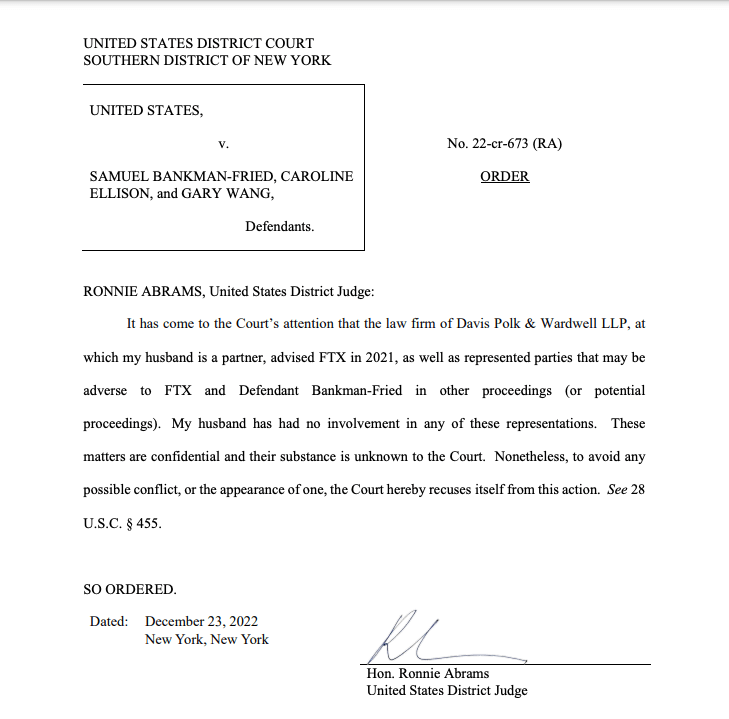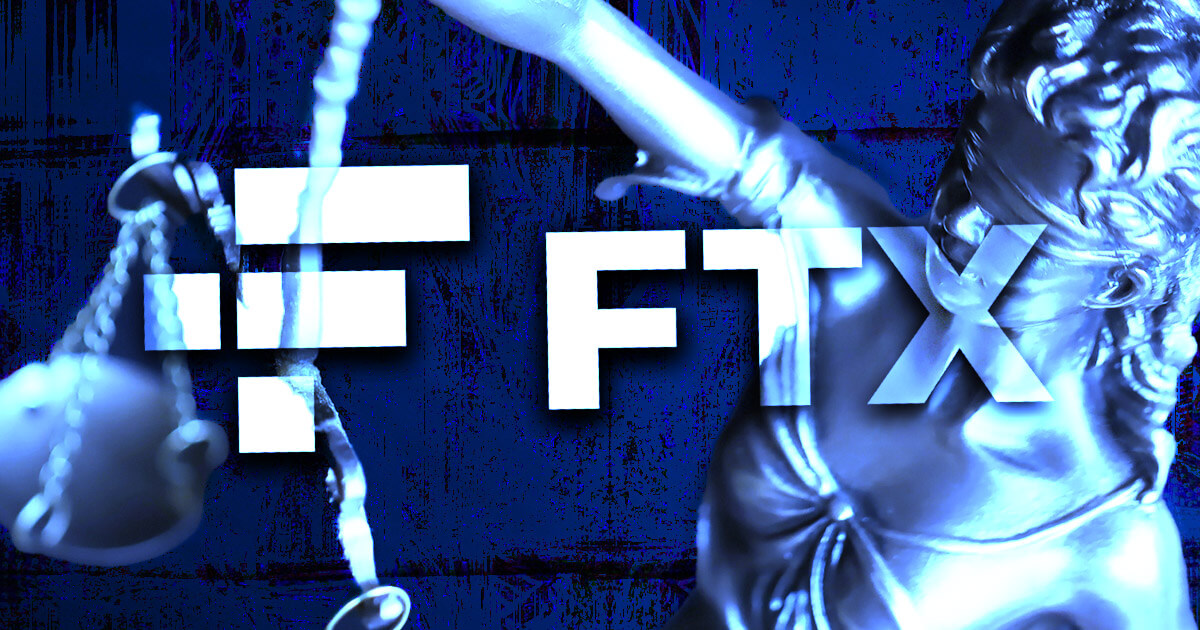[ad_1]
Federal Judge Ronnie Abrams, who was assigned to oversee the high-profile criminal trial of former FTX CEO Sam Bankman-Fried (SBF), recused herself from the case on Dec. 23. In a court order, the federal judge for the US District Court for the Southern District of New York cited possible conflict of interest as the reason for stepping down.
In the order, the judge said that the law firm of Davis Polk & Wardwell LLP, in which her husband is a partner, provided legal advice to the now-defunct crypto exchange FTX in 2021. The judge added that Davis Polk & Wardwell LLP had represented parties “that may be adverse to FTX and Defendant Bankman-Fried in other proceedings (or potential proceedings).”
The court order noted that Abrams’ husband, Greg D. Andres, “had no involvement” in any of the representations of FTX and related parties. While the details of the dealings between FTX and Davis Polk & Wardwell LLP are confidential and consequently unknown to Abrams, nevertheless, she recused herself “to avoid any possible conflict or the appearance of one.”

It is unknown when a new judge from the Southern District of New York will be selected for the SBF trial. Usually, judges are randomly assigned cases and only excluded when there is a potential conflict of interest.
Some have raised questions about why Abrams waited so long to recuse herself. According to a report by The New York Times, Abrams was appointed to the case even before SBF was extradited to the US on Dec. 21.
However, it is to be noted that judges usually discuss the conflict of interest matters with the district’s chief judge and an ethics committee and look up precedents before making such decisions.
Abrams’ recusal comes a day after another judge, Gabriel Gorenstein, approved SBF’s release against a $250 million bail bond. The humongous bail amount, however, has created controversy since SBF did not pay a penny.
Instead, the bail was secured by SBF’s parents, who put up their family home, reportedly worth $4 million, as collateral. The bail amount is only owed to the court if SBF fails to attend his court hearings.
Moreover, some question the leniency of approving bail and whether it was justified given the scale of alleged fraud charges against SBF. Some have also derided that SBF had failed to secure bail in the Bahamas but that the US legal system was more lenient.
[ad_2]
Read More: cryptoslate.com










 Bitcoin
Bitcoin  Ethereum
Ethereum  Tether
Tether  XRP
XRP  Solana
Solana  USDC
USDC  TRON
TRON  Dogecoin
Dogecoin  Lido Staked Ether
Lido Staked Ether  Cardano
Cardano  Wrapped Bitcoin
Wrapped Bitcoin  Hyperliquid
Hyperliquid  Wrapped stETH
Wrapped stETH  Bitcoin Cash
Bitcoin Cash  Sui
Sui  LEO Token
LEO Token  Chainlink
Chainlink  Stellar
Stellar  USDS
USDS  Avalanche
Avalanche  WhiteBIT Coin
WhiteBIT Coin  Toncoin
Toncoin  Binance Bridged USDT (BNB Smart Chain)
Binance Bridged USDT (BNB Smart Chain)  Shiba Inu
Shiba Inu  Litecoin
Litecoin  WETH
WETH  Wrapped eETH
Wrapped eETH  Hedera
Hedera  Ethena USDe
Ethena USDe  Monero
Monero  Polkadot
Polkadot  Bitget Token
Bitget Token  Coinbase Wrapped BTC
Coinbase Wrapped BTC  Pi Network
Pi Network  Uniswap
Uniswap  Pepe
Pepe  Dai
Dai  Aave
Aave  OKB
OKB  Ethena Staked USDe
Ethena Staked USDe  BlackRock USD Institutional Digital Liquidity Fund
BlackRock USD Institutional Digital Liquidity Fund  Bittensor
Bittensor  sUSDS
sUSDS  Aptos
Aptos  Cronos
Cronos  Internet Computer
Internet Computer  Jito Staked SOL
Jito Staked SOL  NEAR Protocol
NEAR Protocol  Ethereum Classic
Ethereum Classic